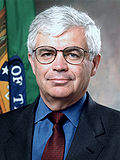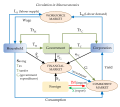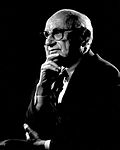Rational expectations is an economic theory that seeks to infer the macroeconomic consequences of individuals' decisions based on all available knowledge...
14 KB (2,091 words) - 22:37, 19 June 2025
Inflation (redirect from Inflation expectations)
begets further inflationary expectations, which beget further (built-in) inflation. The important role of rational expectations is recognized by the emphasis...
124 KB (14,276 words) - 20:47, 23 June 2025
model of how expectations are formed, called rational expectations. The use of rational expectations have largely replaced adaptive expectations in macroeconomic...
7 KB (995 words) - 20:03, 23 June 2025
John Muth (section Hypothesis of rational expectations)
He is "the father of the rational expectations revolution in economics", primarily due to his article "Rational Expectations and the Theory of Price Movements"...
8 KB (953 words) - 07:11, 6 May 2024
Robert Lucas Jr. (section Rational expectations)
Sciences in 1995 "for having developed and applied the hypothesis of rational expectations, and thereby having transformed macroeconomic analysis and deepened...
23 KB (1,978 words) - 10:38, 24 June 2025
which confounded the traditional Phillips curve. The rational expectations theory said that expectations of inflation were equal to what actually happened...
41 KB (5,606 words) - 23:50, 5 June 2025
Cobweb model (section Role of expectations)
adaptive expectations may make ever-increasing errors over time has led many economists to conclude that it is better to assume rational expectations, that...
18 KB (2,541 words) - 21:11, 10 April 2025
Sargent's main contributions to rational expectations were these: trace the implications of rational expectations, with Wallace, for alternative monetary-policy...
25 KB (2,085 words) - 17:48, 4 May 2025
the importance of foundations based on microeconomics, especially rational expectations. New classical macroeconomics strives to provide neoclassical microeconomic...
14 KB (1,636 words) - 22:19, 21 March 2025
served as an underpinning of a new class of empirical models with rational expectations and sticky prices—sometimes called new Keynesian models. In a 1993...
34 KB (3,190 words) - 04:52, 14 June 2025
macroeconomists criticized Keynesian models that did not work under rational expectations. Lucas also argued that Keynesian empirical models would not be...
119 KB (13,295 words) - 21:50, 27 May 2025
Robert Lucas introduced rational expectations to macroeconomics. Prior to Lucas, economists had generally used adaptive expectations where agents were assumed...
66 KB (7,913 words) - 18:47, 23 May 2025
macroeconomics Homo economicus Lucas critique Efficient-market hypothesis Rational expectations Real business cycle theory Ricardian equivalence Saltwater theories...
9 KB (1,014 words) - 10:18, 14 March 2025
macroeconomic analysis usually assumes that households and firms have rational expectations. However, the two schools differ in that New Keynesian analysis...
49 KB (6,202 words) - 19:18, 23 June 2025
Rational choice modeling refers to the use of decision theory (the theory of rational choice) as a set of guidelines to help understand economic and social...
60 KB (7,159 words) - 10:10, 7 June 2025
rational expectations; and was at the forefront of what came to be known as the 'rational expectations revolution'. At this time adaptive expectations was...
16 KB (1,883 words) - 18:43, 13 December 2024
and "rational expectations" theory, led by Robert Lucas, and real business cycle theory. In contrast, the new Keynesian approach retains the rational expectations...
176 KB (17,991 words) - 04:58, 26 June 2025
by Thomas J. Sargent and Neil Wallace based upon the theory of rational expectations, which posits that monetary policy cannot systematically manage...
12 KB (1,481 words) - 18:12, 7 September 2024
Long-Term Contracts, Rational Expectations, and the Optimal Money Supply Rule, which reconciled the concept of rational expectations—developed by new classical...
32 KB (2,540 words) - 20:27, 20 June 2025
to new classical macroeconomics heavily based on the concept of rational expectations. The freshwater–saltwater distinction is largely antiquated today...
49 KB (5,194 words) - 00:15, 25 May 2025
proposition extends the model by arguing that, since people with rational expectations cannot be systematically surprised by monetary policy, monetary...
8 KB (983 words) - 21:06, 11 June 2021
______, "Reflections on Rational Expectations," Journal of Money, Credit and Banking, Vol. 12, No. 4, Part 2: Rational Expectations (Nov., 1980), pp. 826–832...
17 KB (1,556 words) - 13:08, 13 January 2025
supply and price and output changes in a simplified economy using rational expectations. It delivered a new classical explanation of the Phillips curve...
6 KB (749 words) - 17:57, 11 May 2025
two "seemingly incompatible" concepts: bounded rationality and rational expectations. Bounded rationality was developed by Herbert A. Simon, along with...
15 KB (1,937 words) - 17:40, 1 June 2025
Homo economicus (redirect from Rational investor)
decision for themself. See rational choice theory and rational expectations for further discussion; the article on rationality widens the discussion. As...
30 KB (3,969 words) - 13:13, 21 March 2025
Rationality is the quality of being guided by or based on reason. In this regard, a person acts rationally if they have a good reason for what they do...
135 KB (15,419 words) - 21:53, 31 May 2025
came under heavy criticism with the introduction of John Muth's rational expectations, which was popularized by future Nobel prize winner Robert Lucas...
35 KB (3,882 words) - 20:03, 3 June 2025
by Robert Hall in a rational expectations model. Originally applied to consumption and income, the process of future expectations is thought to influence...
31 KB (3,622 words) - 21:43, 22 May 2025
elaborated a new approach in which rational expectations were presumed instead of the Friedmanian adaptive expectations. Due to this reformulation, the story...
159 KB (16,262 words) - 03:24, 26 June 2025
of new classical macroeconomics, built around the assumption of rational expectations. In 1979, Barro defined the Ricardian equivalence theorem as follows:...
18 KB (2,021 words) - 19:56, 21 August 2024











